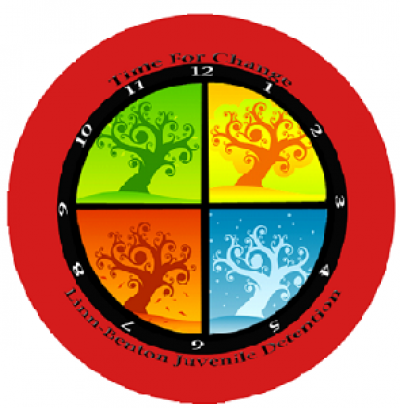Time for Change Program
Vision: To provide public safety by helping youth and families achieve positive change.
Mission: To increase public safety by coaching youth and families to make positive choices through education, skill building, and community partnerships.
The Time for Change program was created to help address crime producing needs of moderate to high risk youth, provide public safety and offer alternatives to youth who would otherwise be candidates for out of home placement at residential treatment centers and youth correctional facilities.
Program Goals
- To increase the youth’s ability to identify risky thoughts that lead to high risk behaviors
- To develop skills and alternatives to the risky thoughts and high risk behaviors
- To work with parents and community providers to better understand and concentrate on criminogenic risk
- To increase public safety and decrease new law violations
Program Design
The Time for Change program is located at the Linn-Benton Detention Center. The program is a 30 day program, serving youth ages 12-17 years of age in a secure setting. The program aims to address issues of juvenile offenders who are in need of a higher level of intervention and supervision. This higher level is determined by their Juvenile Crime Prevention Risk Assessment. This assessment is a reliable and validated tool for measuring a youth’s risk to reoffend.
The Time for Change program is structured on an evidence-based cognitive behavioral restructuring model. This model has been proven to greatly reduce juvenile recidivism. The model helps youth form the connection between their thoughts, attitudes, and emotions to their behaviors. Also, the model promotes the ability to identify thinking errors and substitute those thinking errors for responsible thinking. The model aims to increase pro-social thinking and skills through coaching, modeling, and role playing.
Every youth who participates in the Time for Change program will have a team consisting of their juvenile probation officer, a primary and secondary detention staff and their parents/ guardians. An individualized plan will be developed by the team focused on specific risk areas targeting attitudes, values, and beliefs; substance use, family functioning, behavior issues, peer and other relationships, and school issues. Youth will focus on learning needed skills defined by the youth, parent, juvenile department, and other agencies involved in the youth’s care.
Skills Sets are learned through Skill Streaming and are;
- Beginning Social Skills, Advanced Social Skills, Skills for Dealing with Feelings, Skills Alternative to Aggression, Skills for Dealing with Stress, and Planning Skills.
Youth may also be assigned to complete the Risk Management Curriculum. This specific curriculum focuses on understanding risks, responding to warning signs regarding risk, and being able to appropriately manage risk.
The youth and his/her team may determine other activities and/or curriculum that the youth may want to participate in such as attending Mental Health meetings or Alcohol and Drug meetings.

